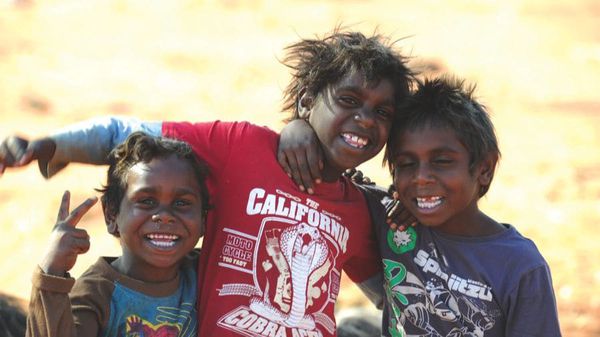Eye For Film >> Movies >> Utopia (2013) Film Review
Utopia
Reviewed by: Jennie Kermode

Twenty-eight years ago, the campaigning journalist John Pilger made The Secret Country, exploring the history of how Australia's indigenous people have been treated by those who emigrated there from Europe. Though it was groundbreaking in its time, it has been followed by a number of films exploring different aspects of the same subject; public awareness of these issues has increased significantly. What people outside Australia remain largely unaware of, however, is how difficult life remains for indigenous people there today. In returning to the subject, Pilger interweaves past and present, centering his film on a visit to Utopia, an outback settlement that would not look out of place in a third world country, though Australia is one of the richest nations in the world.
It's a powerful subject. The film, unfortunately, doesn't always give it its due. Pilger persists with the rather hectoring style he has developed in recent years, which is interesting when it prompts interviewees to blurt out angrily things they may later wish they hadn't said, but less so when the points they are endeavouring to make are subtle ones. Yes, the situation is upsetting, but he's emotional to the point where he sometimes seems unable to think usefully about proposed solutions, and this can dilute the impact of stories that speak loudly enough by themselves. The scenes in which indigenous people describe the situations they deal with day to day are the most effective, and there's plenty for the viewer to take in directly as the camera roves around tin shacks, unsanitary public toilets and old people sitting outside in the searing heat.

In terms of exploring its subject, this is quite comprehensive, moving swiftly over the background of colonisation, slavery and the Stolen Generation to look at the more covert forms that racism takes in the country today. Dubious allegations of child abuse rings within indigenous communities are treated with a proper degree of horror but take a while to identify the key point - that even if some abuse does exist, that's no different from the situation in white society. There are places where it might be useful to draw parallels with other impoverished communities around the world, for instance where white people complain that indigenous people don't work hard enough to resolve their own problems "must like to live that way," but most viewers will probably recognise the wider social issues underlying these remarks. For all the impressive interviews with key political figures that Pilger has managed to get, the most striking moments come when he interviews ordinary members of the public who are celebrating Australia day, encountering confusion, denial, blame displacement and outright contempt as he asks them why they think indigenous people are unlikely to be joining the party.
Despite its intermittent clumsiness, this is an important film on a topic too rarely addressed and its point comes across well enough. There is a great deal here that is deserving of a wider audience than it is likely to get.
Reviewed on: 04 Nov 2013

















